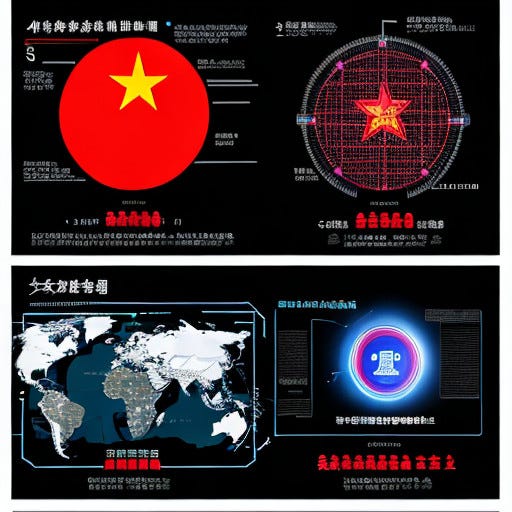China's AI Ascent: From Copycat to Contender
From Imitator to Innovator: How China Transformed into an AI Superpower and What it Means for the Technology Arms Race
Over the past decade, China has rapidly emerged as a top global contender in artificial intelligence (AI), transforming from a copycat of Western innovation to a leader driving new advancements. This rise coincides with escalating geopolitical tensions between China and the West, sparking concern about an "AI arms race" and where the balance of power will shift next.
In recent years, China has made major strides in AI capabilities. After initially replicating innovations from Silicon Valley, Chinese researchers are now publishing cutting-edge papers, contributing to academic conferences, and developing homegrown advances like facial recognition software. However, China's approach differs from the West's in key ways. Its development is more top-down, with the central government providing direction and institutions collaborating on projects. The focus is also more on industrial applications like manufacturing and surveillance, rather than consumer products.
According to AI pioneer and entrepreneur Demis Hassabis, China is now at least on par with the US in certain domains. But he cautions against overestimating China's capabilities or underestimating America's strengths in talent and innovation ecosystems. While China has achieved much, its progress has limits. In semiconductors, for instance, China excels at lower-end chips but still lags behind in manufacturing the most advanced chips critical for leading-edge AI systems.
Nonetheless, US policymakers are increasingly alarmed about China's rapid strides and access to key technologies. Recent export controls have restricted sales of advanced AI chips like Nvidia GPUs to Chinese buyers. Advocates believe such containment strategies are necessary to curb China's influence and prevent uncontrolled AI proliferation. But critics warn these measures could backfire, galvanizing China to develop its own independent capabilities out of necessity.
According to AI policy expert Helen Toner, while reasonable to view China as a serious competitor, fears of it overtaking the US may be overblown. America still leads in critical areas like semiconductor fabrication, talent concentration in tech hubs, and the open academic ecosystem that drives breakthroughs. Rather than a desperate race, she sees cooperation as vital to steer AI development responsibly.
AI's National Security Implications
Much rhetoric around US-China AI competition has described it in militaristic terms like an "arms race" or "clash of titans." Some fear unchecked AI advancements could eventually lead to catastrophic consequences like autonomous weapons. Thus, nations are racing to dominate in AI for national security interests.
However, experts say framing AI primarily as a security contest is misleading. According to Toner, the arms race metaphor fits best in military domains, where one nation aims to maintain advantage over potential adversaries. But in most commercial domains, AI development is not a zero-sum game - progress benefits all parties, not just one winner.
Chinese scholar Dan Wang adds that consumer internet platforms are not currently a prime focus for China. The government is more concerned about economic initiatives in manufacturing and industrial capabilities. While controversies surround social media applications like WeChat, China has imposed tighter data regulations to constrain corporate AI development. Surveillance and censorship represent a separate track, driven by security services rather than commercial motives.
In Wang's view, current tensions seem to be less about AI capabilities themselves, and more about broader economic competition and clashes over values. There are legitimate technology security risks, but we must be judicious in distinguishing technologies that truly warrant containment. If overly broad export controls stifle progress in beneficial technologies like renewable energy, the resulting fragmentation may do more harm than good.
The Role of Talent and Research Ecosystems
Looking forward, a key driver of AI leadership will be the ability to attract and cultivate elite technical talent. While China has skilled researchers, a concentration of top experts currently congregates in American tech hubs like Silicon Valley.
Hassabis believes physical proximity remains essential, even amidst pandemic-driven remote work trends. Leading US universities also play an integral role training future AI leaders and incubating startups commercializing cutting-edge research. Major big-tech companies then recruit this talent and invest billions developing powerful models.
However, open academic ecosystems also benefit China. Knowledge flows freely through published papers and conferences, allowing Chinese scientists to stay abreast of latest advances. American attempts to restrict knowledge flows could thus backfire by inhibiting domestic progress.
In Toner's view, continuing US leadership in AI will depend less on containing rivals than sustaining the American research ecosystem and advantages in free inquiry. While China makes impressive strides, she believes the overall fundamentals still favor the US in an open, intellectually competitive AI landscape.
The Perils of Fragmentation
Looking ahead, perhaps the greatest risk is not being overtaken by a rival, but the splintering of technology ecosystems. As geopolitical fragmentation accelerates, it gets harder for nations to cooperate on shared challenges. AI systems trained on data from different societies may develop cultural biases that hamper understanding.
Divergent values and governance approaches on issues like privacy and security may lead AI down drastically different trajectories in different regions. Chinese facial recognition, for instance, has raised concerns about surveillance overreach and erosion of civil liberties, even while technically impressive.
On issues like climate change, continued cooperation remains critical. Escalating technological decoupling could jeopardize progress on shared existential priorities that require global coordination. There are certainly risks if values radically diverge, with different flavors of AI optimized for very different societies. But preventing uncontrolled AI proliferation need not equate to strangling progress across the board.
Navigating the Road Ahead
The path ahead remains uncertain as the tectonic plates of technological innovation and geopolitical rivalry shift. While fears of being suddenly overtaken may be exaggerated, China's emergence as an AI peer rival marks a seismic change. The post-Cold War era of unquestioned US technological dominance has ended.
Yet an "us vs them" mentality risks becoming a self-fulfilling prophecy. Progress depends on balancing strategic interests with openness, not just in hardware but in the battle of ideas. True leadership means steering AI's arc toward enlightenment, not dominion. Prioritizing integration over fragmentation and control puts humanity's shared interests over any single nation's desires. By cultivating wisdom alongside ingenuity, the awakening of artificial intelligence can illuminate rather than imperil our future.
Your own personal army of bots, continuously producing VIDEO CONTENT across all social media platforms.
Generating TRAFFIC, LEADS, and attracting CLIENTS, all for YOU!
Sit back, RELAX. Let Artificial Intelligence do the heavy lifting FOR YOU.
Your business transformed, a powerhouse of wealth, forging a secure future for you and your family.
But BEWARE… Those hesitant to adopt AI risk falling behind, their income dwindling, struggling to provide…
Don’t get left behind! Embrace the future.
Join our AI Creators Club.
*All images above were generated with AI
Add To Cart
Your initial payment will be $1.
After 30 days, your subscription will be renewed monthly at $37/month.
You are basically are getting access to everything for only $1 for an entire month.
No contract, no obligations. You can cancel any time.













